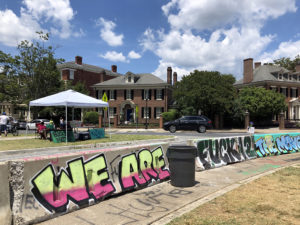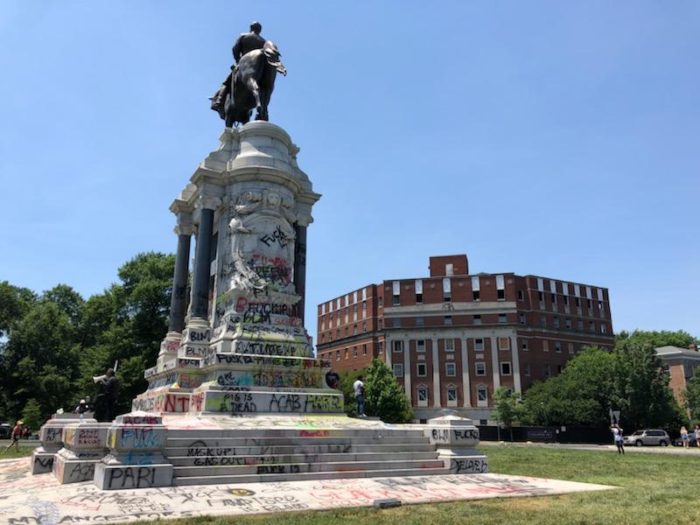It turns out the Lee Monument lawsuits were too close to home for Judge Bradley Cavedo after all.
The longtime Richmond Circuit Court judge on Thursday recused himself from presiding over the case filed by William Gregory which seeks to prevent the removal of the state-owned Lee statue along Monument Avenue.
Cavedo, as BizSense first reported last month, lives just off Monument Avenue a couple blocks over from the Lee statue.
That hadn’t stopped him from ruling over the case for its first six weeks, during which time he made the high profile decision to grant an indefinite injunction stopping Gov. Ralph Northam from ordering the removal of the towering Confederate relic.
But in his recusal order filed with the court on Thursday, Cavedo said the location of his residence, in the end, proved to be an issue.
“Upon further reflection on the issues in this case, I conclude that the location of my home in the vicinity of the Lee Monument area may create the appearance of a bias among some Virginians,” the order stated. “I was unaware at the outset of this case that I lived in the Monument Avenue Historic District. I therefore recuse.”

With Monument Ave. homes behind it, graffiti covers a barrier installed by the state on the perimeter of the grassy area surrounding the Lee statue.
While Cavedo’s home is in technically in the Fan and not directly on Monument Avenue, it is within the boundaries of the federally designated Monument Avenue Historic District.
The benefits of living within that district and the effects of the monuments on property values were a focus of a second Lee Monument-related case, which was filed last month by Monument Avenue resident Helen Marie Taylor.
Cavedo previously recused himself from the proposed combination of that case into the Gregory case. That consolidation effort was made moot Thursday when the Taylor case was dismissed at the request of the plaintiffs.
Thursday’s recusal also follows a report last week by Courthouse News of an op-ed Cavedo penned in the student newspaper while attending University of Richmond in the late 1970s, in which he decried desegregation of schools and voter registration efforts, among other topics of the day.
The Gregory case is now in the hands of Judge W. Reilly Marchant, who also had presided over the Taylor matter. Marchant is the third judge to handle the Gregory case, as Judge Beverly Snukals recused herself before it was passed to Cavedo.
Marchant was the sixth judge on the Taylor case, following a hot potato procession of recusals among his peers.
It’s unclear how, if at all, the change to a new judge will affect the Gregory case going forward, including what it means for the status of the indefinite injunction put in place by Cavedo last month.
Gregory, a descendant of the family that sold the land on which the Lee monument sits to the state in the late 1800s, argues that the deed from that 19th Century deal prevents Northam from taking down the monument.
Attorney General Mark Herring’s office, which is representing the governor in the case, said in a prepared statement Thursday it hopes the change doesn’t delay the case further.
“Attorney General Herring remains committed to making sure this divisive and antiquated relic comes down as soon as possible and we’re hopeful that this won’t cause any delay in resolving the matter.”
Cavedo also late Thursday recused himself from a newer case filed by an anonymous plaintiff against Richmond Mayor Levar Stoney and Richmond City Council, seeking to prevent the removal of the remaining city-owned Confederate monuments.
Cavedo, at a hearing in that case last week, granted a 60-day stop to Stoney’s efforts to take down the monuments. That was after his administration had removed many of the city’s statues, including Stonewall Jackson and J.E.B Stuart.
Judge Marchant now presides on that case as well.
It turns out the Lee Monument lawsuits were too close to home for Judge Bradley Cavedo after all.
The longtime Richmond Circuit Court judge on Thursday recused himself from presiding over the case filed by William Gregory which seeks to prevent the removal of the state-owned Lee statue along Monument Avenue.
Cavedo, as BizSense first reported last month, lives just off Monument Avenue a couple blocks over from the Lee statue.
That hadn’t stopped him from ruling over the case for its first six weeks, during which time he made the high profile decision to grant an indefinite injunction stopping Gov. Ralph Northam from ordering the removal of the towering Confederate relic.
But in his recusal order filed with the court on Thursday, Cavedo said the location of his residence, in the end, proved to be an issue.
“Upon further reflection on the issues in this case, I conclude that the location of my home in the vicinity of the Lee Monument area may create the appearance of a bias among some Virginians,” the order stated. “I was unaware at the outset of this case that I lived in the Monument Avenue Historic District. I therefore recuse.”

With Monument Ave. homes behind it, graffiti covers a barrier installed by the state on the perimeter of the grassy area surrounding the Lee statue.
While Cavedo’s home is in technically in the Fan and not directly on Monument Avenue, it is within the boundaries of the federally designated Monument Avenue Historic District.
The benefits of living within that district and the effects of the monuments on property values were a focus of a second Lee Monument-related case, which was filed last month by Monument Avenue resident Helen Marie Taylor.
Cavedo previously recused himself from the proposed combination of that case into the Gregory case. That consolidation effort was made moot Thursday when the Taylor case was dismissed at the request of the plaintiffs.
Thursday’s recusal also follows a report last week by Courthouse News of an op-ed Cavedo penned in the student newspaper while attending University of Richmond in the late 1970s, in which he decried desegregation of schools and voter registration efforts, among other topics of the day.
The Gregory case is now in the hands of Judge W. Reilly Marchant, who also had presided over the Taylor matter. Marchant is the third judge to handle the Gregory case, as Judge Beverly Snukals recused herself before it was passed to Cavedo.
Marchant was the sixth judge on the Taylor case, following a hot potato procession of recusals among his peers.
It’s unclear how, if at all, the change to a new judge will affect the Gregory case going forward, including what it means for the status of the indefinite injunction put in place by Cavedo last month.
Gregory, a descendant of the family that sold the land on which the Lee monument sits to the state in the late 1800s, argues that the deed from that 19th Century deal prevents Northam from taking down the monument.
Attorney General Mark Herring’s office, which is representing the governor in the case, said in a prepared statement Thursday it hopes the change doesn’t delay the case further.
“Attorney General Herring remains committed to making sure this divisive and antiquated relic comes down as soon as possible and we’re hopeful that this won’t cause any delay in resolving the matter.”
Cavedo also late Thursday recused himself from a newer case filed by an anonymous plaintiff against Richmond Mayor Levar Stoney and Richmond City Council, seeking to prevent the removal of the remaining city-owned Confederate monuments.
Cavedo, at a hearing in that case last week, granted a 60-day stop to Stoney’s efforts to take down the monuments. That was after his administration had removed many of the city’s statues, including Stonewall Jackson and J.E.B Stuart.
Judge Marchant now presides on that case as well.

Agreed. It has long been publicly reported that he lives in the Monument District.
The UofR oped was concrete evidence for what many of us already believed to be the case.
If he truly didn’t know he lived in the monument ave historic district, I honestly question his ability to actively try any future case just as an indication of failing faculties
This is like the Henrico representative that didn’t know he had a quarry in his district.
You can’t say you stand for the people in one sentence and then when the shit hits the fan say I didn’t know anything about where I permanently reside